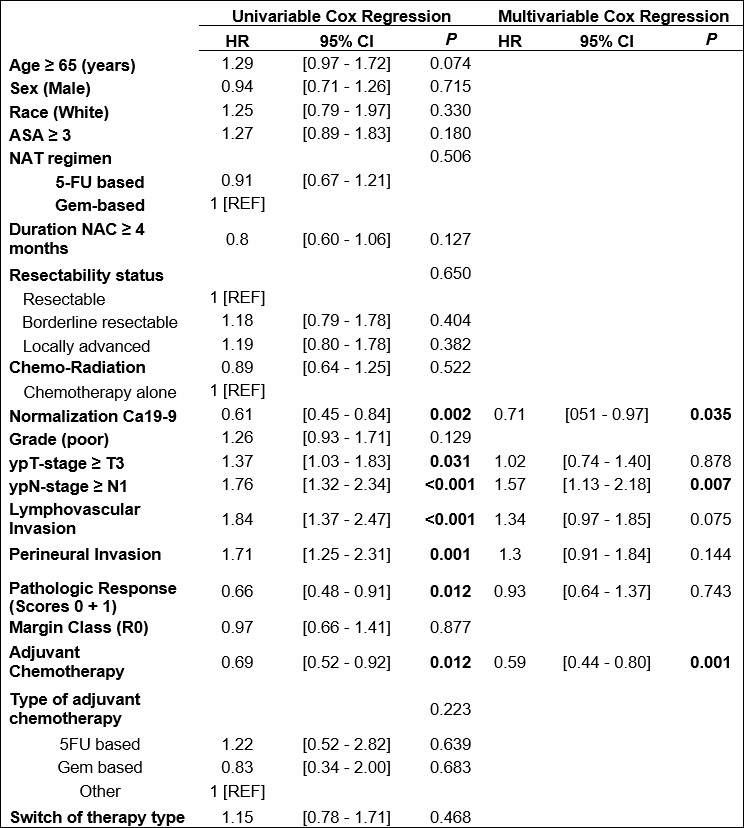TAILORING ADJUVANT CHEMOTHERAPY TO BIOLOGIC RESPONSES FOLLOWING NEOADJUVANT CHEMOTHERAPY IMPACTS OVERALL SURVIVAL IN PANCREATIC CANCER
Elie Ghabi*1, Sami Shoucair1, Ammar A. Javed2, Ding Ding1, Elizabeth Thompson1, Lei Zheng1, John Cameron1, Christopher L. Wolfgang2, Christopher Shubert1, Kelly J. Lafaro1, Richard Burkhart1, William R. Burns1, Jin He1
1Johns Hopkins University School of Medicine, Baltimore, MD; 2NYU Langone Health, New York, NY
Introduction:
The role of adjuvant chemotherapy in patients with resected pancreatic ductal adenocarcinoma (PDAC) who completed neoadjuvant chemotherapy (NAT) is unknown. Clinicians may use change in carbohydrate antigen (CA)19-9 and pathological response to treatment in therapy decisions. We sought to assess the utility of these treatment-related biomarkers and other clinical factors to guide optimal postoperative therapy for patients following NAT and curative-intent surgery.
Methods:
Patients with resected PDAC who received NAT between 2011 and 2019 were retrospectively reviewed. Patients with undetectable CA19-9 (defined as CA19-9 less than 3U/mL) and patients with non-elevated CA19-9 values prior to NAT were excluded. Preoperative treatment response was classified by CA19-9 trend and histopathologic response score performed on surgical specimen. The use of adjuvant chemotherapy and regimen were analyzed in the context of biologic and pathologic response. Survival analysis was performed using Kaplan-Meier estimates and validated with backwards stepwise Cox regression.
Results:
Of the 345 patients who received NAT, CA19-9 normalization was observed in 125 (36.2%). A complete or marked pathologic response was observed in 103 patients (29.8%). Univariate analysis revealed that CA19-9 normalization was associated with favorable pathological findings including histopathologic response score (41.6% vs. 23.2%, p < 0.001), ypT stage (p < 0.001) and ypN stage (p = 0.003) (Table 1). Survival analysis revealed that CA19-9 normalization and ypN stage were associated with improved overall survival (p=0.04 and p=0.01 respectively). Adjuvant chemotherapy was associated with improved overall survival only in patients in whom CA19-9 normalization was not observed (26.8 months vs. 16.4 months, p=0.008). Furthermore, patients who did not normalize and had ypN1 disease benefited from adjuvant chemotherapy (25.4 months vs. 9.16 months, p<0.001) whereas patients with ypN0 disease did not (27.6 months vs. 29.9 months, p=0.341). In patients who received 5FU-based NAT without CA19-9 normalization, further adjuvant 5FU-based chemotherapy was associated with improved overall survival (p=0.017), whereas change to adjuvant gemcitabine-based chemotherapy was not associated with improved OS in these patients (p=0.142).
Conclusion:
In patients with localized PDAC undergoing NAT, the change in CA19-9 is associated with treatment response and serves as a useful biomarker. When CA19-9 normalizes during NAT, adjuvant chemotherapy following curative-intent surgery may not be beneficial. However, additional 5FU-based chemotherapy is associated with improved survival in those patients with persistently elevated CA19-9.
Back to 2022 Abstracts
